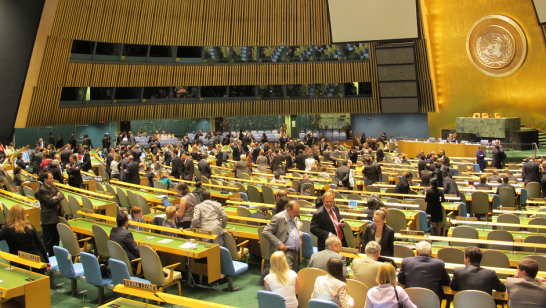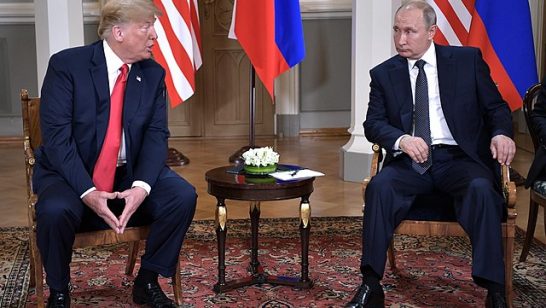
The 9th Review Conference of the Nuclear Non-Proliferation Treaty (NPT) will begin next week. Frustration at the lack of progress over implementation of the 2010 pledges, particularly on disarmament, as well as distrust and disagreements between the Treaty’s state parties is likely to emerge as the main challenge. As one of the five official Nuclear Weapon States (NWS) committed to “accelerate concrete progress on the steps leading to nuclear disarmament” how has the United Kingdom fared since 2010 and what aims should it pursue at the forthcoming meeting?
As recently as January 2015, the UK stated that “as a responsible nuclear weapon state and party to the Treaty on the Non Proliferation of Nuclear Weapons (NPT) the UK remains committed to creating the conditions for a world without nuclear weapons.”[1] In its 2010 Strategic Defence and Security Review (SDSR), the UK announced that its nuclear deterrent could remain credible with a smaller nuclear capability. It committed to reducing operational missiles on each of its Vanguard class submarines to no more than eight; reducing the number of deployed warheads on each Vanguard class submarine from 48 to 40; and reducing the number of operationally available warheads from approximately 160 to no more than 120. In January 2015, Defence Secretary Michael Fallon announced that these reductions have been implemented.[2]
Despite these steps, the current government and the opposition Labour Party are both firmly committed to renewing the UK’s nuclear weapons programme. With a year remaining until the main investment decision to replace the current nuclear delivery platform the Vanguard-class nuclear submarines that carry the Trident ballistic missile (commonly known simply as ‘Trident’) it seems likely that this programme to renew the boats will proceed.[3]
Since 2010, the UK has been the only NWS to carry unilateral nuclear reductions. Furthermore, in 2010 the UK made its total overall nuclear stockpile public for the first time, announcing that the total number of weapons would not exceed 225 and would be further reduced to no more than 180 by the mid-2020s. Its other NPT-related achievements include refraining from nuclear testing since 1991; ratifying the Comprehensive Test Ban Treaty in 1998; ceasing the production of fissile material for military purposes; and reducing to a single nuclear weapons delivery system, the only country of the five NWS to do so.
The UK has also taken an active role in the “P5 process” where the five NWS meet to discuss transparency, verification and confidence-building measures. The UK initiated the process and out of the six P5 meetings so far, it has hosted the first and last. Emerging from this process is a common reporting framework and a glossary of agreed key nuclear terms. Although criticised for its slow progress and limited concrete outputs, the process nonetheless builds confidence between the NWS and has established a new forum for dialogue on their NPT commitments. At the most recent meeting in London, the UK made a particular effort to engage civil society and Non-Nuclear Weapon States (NNWS), namely states from the Non-Proliferation and Disarmament Initiative (NPDI). Having boycotted the first two conferences of the Humanitarian Impact of Nuclear Weapons in Norway and Mexico, the UK decided, along with the United States, to attend the latest meeting in Vienna in December 2014 – a move which was welcomed by NNWS and civil society. At the same time, the UK remains clearly opposed to the proposal of negotiating a new legal instrument banning nuclear weapons, promoted by some participants.
The UK holds a good track record in examining how to implement an effective future verification regime for warhead dismantlement. From 2007 to 2010, it worked with the Norwegian government and VERTIC, a British NGO, on a joint initiative examining the procedural and technical challenges of verifying nuclear warhead dismantlement. This was the first time a NWS and a NNWS have collaborated on a project of this nature. The two countries subsequently submitted a Working Paper to the 2010 NPT Review Conference setting out key findings.[4] In 2012, the UK then hosted a P5 expert meeting in London drawing on the UK-Norway Initiative. Later that year, it held a similar side-meeting at the NPT Preparatory Committee, this time also inviting experts and civil society. Furthermore, since 2000 it has worked with the United States on the US-UK Technical Verification project.
With respect to parliamentary engagement, the UK is unique among the P5 in having senior serving parliamentarians, mostly former Defence and Foreign Secretaries or Chiefs of Defence Staff, advocating exclusively for multilateral nuclear disarmament. The ‘Top Level Group of UK Parliamentarians for Multilateral Nuclear Disarmament and Non-Proliferation’ (TLG)[5] represents a scaling-up of British cross-(major)party consensus on the issue: the group supports a world free from nuclear weapons but agrees that this can only be achieved incrementally, as opposed to unilateral disarmament.
In the run-up to the previous Review Conference, the UK took a leading role in the movement to re-energise multilateral nuclear disarmament and prevent proliferation. Actions included implementing unilateral nuclear reductions and further transparency on stockpile numbers; working on initiatives to verify disarmament; publishing documents exploring how to create the conditions for a world free of nuclear weapons, all accompanied by bold statements and speeches from senior Ministers. The UK proposal to act as a ‘disarmament laboratory’ evolved into the P5 process. The idea to establish a Nuclear Centre of Excellence[6] was floated but later scrapped, and there has been limited progress beyond what was achieved during the UK-Norway initiative on verifying disarmament.
There are a number of options for the UK to continue to play a leadership role in disarmament at and beyond the 2015 Conference. Although reticent to engage with the humanitarian initiative at first and still fearing that it could undermine the current NPT structures, the UK did attend the last conference. It should continue to engage meaningfully and constructively with this initiative, acknowledging and addressing the frustrations of the NNWS at the slow pace of disarmament whilst stressing the challenges of stepping down the disarmament ladder.
Furthermore, whilst being mindful to keep the unity of the P5 process, the UK should push for more than just the lowest common dominator outputs. It should leverage its leadership for more specific disarmament measures from the other NWS as well as for more transparency, particularly from China. Again, drawing on and expanding its verification work with the US and Norway, it should continue to use its technical experience to continue to explore how a future verification regime would operate, examining how the process could be multilateralised and lessons from the New START verification regime applied. It should also work vigorously on the new US-initiated Nuclear Disarmament Verification and Technical Obstacles project.
Going into next week’s NPT conference, the UK will need to weather the criticism that will be levelled at it and the other NWS for the limited progress on disarmament. It can defend its position, emphasising its achievements to date and calling for a balanced assessment of progress made. But beyond that, the UK has the potential to be a leader in promoting multilateral nuclear disarmament. It can, and should, push for more and kick-start the process of moving beyond the status quo.
[1] HoC Written Statement (HCWS201) MOD, Written Statement made by Secretary of State for Defence (Michael Fallon) on 20 January 2015.
[2] ibid
[3] The Vanguard submarines are scheduled to go out of service in 2028 and thus a successor programme to build their replacements needs to start next year.
[4] https://www.gov.uk/government/uploads/system/uploads/attachment_data/file/28426/npt_revcon_2010_jwp.pdf
[5] The Top Level Group is administered by the European Leadership Network.
[6] The Nuclear Centre of Excellence was intended to initially focus on the development of an economic, low carbon, proliferation resistant fuel cycle. In the longer term, it was thought that the centre could also be used to conduct verification work to support any future fissile material cut-off treaty.
The opinions articulated above represent the views of the author(s), and do not necessarily reflect the position of the European Leadership Network or any of its members. The ELN’s aim is to encourage debates that will help develop Europe’s capacity to address the pressing foreign, defence, and security challenges of our time.



